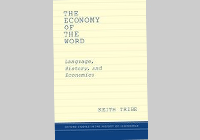
SCAS News - 6 March, 2015
New Book by Former SCAS Fellow Keith Tribe
The Economy of the Word: Language, History, and Economics, the new book by former SCAS Fellow
Keith Tribe, has recently been
published by Oxford University Press (2015). Tribe works as an independent
scholar and translator. He is an economic historian, specializing in European economic thought of the
eighteenth and nineteenth centuries, with a long-standing interest also in the field of language.
Among his
translations are
works by e.g. Reinhart Koselleck, Wilhelm Hennis and Max Weber.
Keith Tribe was Guest of the Principal and in residence at the Collegium in the autumn of 2012. The draft
for most of The Economy of the Word was completed during his time in Uppsala.
ABOUT THE BOOK:
"It was only in the sixteenth century that texts began to refer to the significance of "economic activity"—-of
sustaining life. This was not because the ordinary business of life was thought unimportant, but because the
principles governing economic conduct were thought to be obvious or uncontroversial. The subsequent
development of economic writing thus parallels the development of capitalism in Western Europe. From the
seventeenth to the twenty-first century there has been a constant shift in content, audience, and form of
argument as the literature of economic argument developed. This book proposes that to understand the various
forms that economic literature has taken, we need to adopt a more literary approach in economics specifically,
to adopt the instruments and techniques of philology. This way we can conceive the history of economic thought
to be an on-going work in progress, rather than the story of the emergence of modern economic thinking. This
approach demands that we pay attention to the construction of particular texts, showing the work of economic
argument in different contexts. In sum, we need to pay attention to the economy of the word. l The Economy
of the Word is divided into three parts. The first explains what the term economy has meant from Antiquity to
Modernity, coupling this conceptual history with an examination of how the idea of national income was turned
into a number during the first half of the twentieth century. The second part is devoted to Adam Smith's Wealth
of Nations, considering first the manner in which Smith deals with international trade, and then the way in which
the book was read in the course of the nineteenth century. Part III examines the sources used by Karl Marx and
Léon Walras in developing their economic analysis, drawing attention to their shared intellectual context in
French
political economy."
Read more about Keith Tribe
Read more about the book






